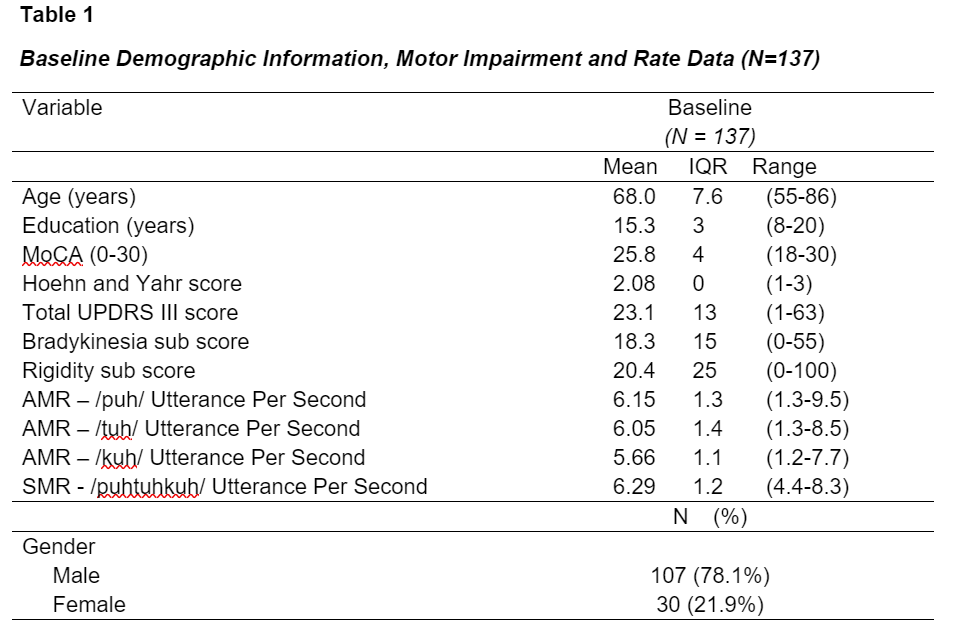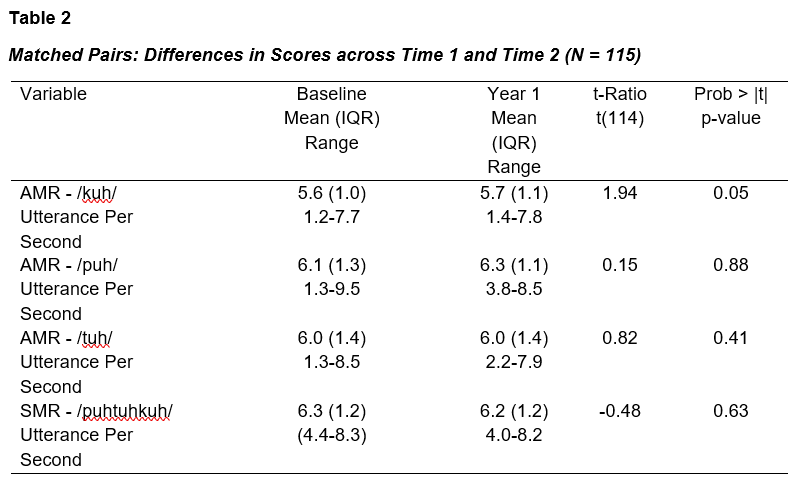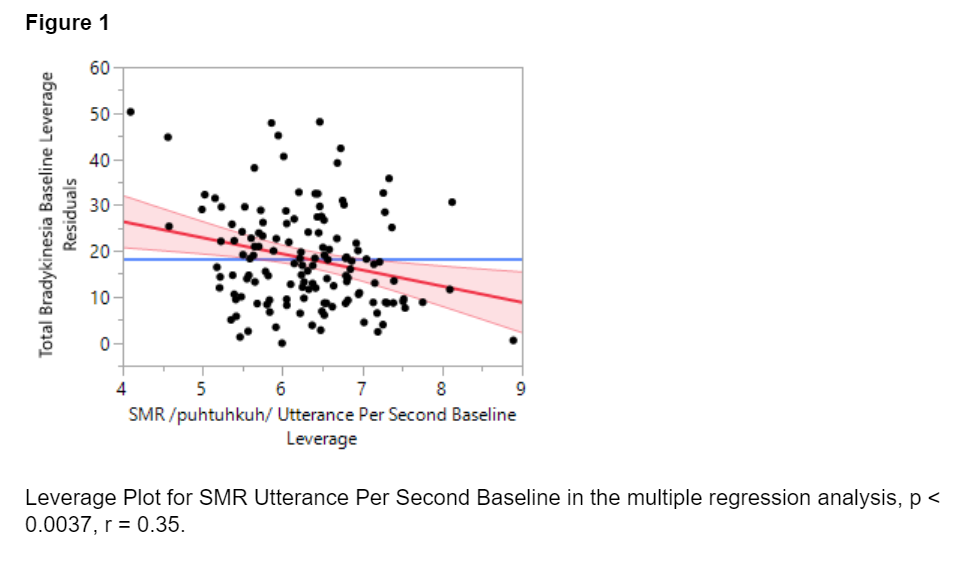Objective: We tested the assumption that speech diadochokinesis (DDK) in Parkinson’s disease (PD) parallels motor system performances by evaluating DDK changes over 12-months and testing if DDK performance predicts limb bradykinesia and rigidity UPDRS scores.
Background: Studies showing that speech DDK correlates with limb bradykinesia[1] and rigidity[2], have led researchers to posit (controversially) whether it could be a surrogate marker of limb motor changes. However, small samples and lack of longitudinal data limit its current utility for remote assessment.
Method: 137 PD participants enrolled in the Ontario Neurodegenerative Disease Research Initiative were included in the analysis [table1], from which 114 participants had valid longitudinal data. DDK tasks, collected in ON state, included Alternating Motion Rate (AMR; rapidly repeated single syllables /puh/, /tuh/, /kuh/ in separate trials) and Sequential Motion Rate (SMR; rapidly repeated 3-syllable sequence /puhtuhkuh/). Duration and count data were extracted using a custom PRAAT script[3] from which we calculated syllable per second rate data. Using the MDS-UPDRS motor examination, administered by an experienced neurologist, we generated bradykinesia and rigidity sub-scores[4]. Using paired t-tests, we compared baseline and year 1 (12-months) DDK performances. We then used the baseline data in a linear multiple regression with each of the four DDK tasks as predictors, and rigidity and bradykinesia sub-scores, separately, as outcomes. JMP statistical software was used, with an alpha level = 0.025, corrected for multiple comparison bias[5].
Results: Across DDK tasks, there were no significant differences between baseline and Time 1 [table2]. Only the SMR task (p<0.003), had a statistically significant association with bradykinesia at baseline (r = 0.35; figure1), remaining p-values >0.25. DDK performances did not predict limb rigidity, all p-values >0.23.
Conclusion: DDK rates did not change over 12-months, possibly due to the early stage of the PD cohort and the lack of global deterioration. It is also possible that DDK rate measures are not sensitive to smaller changes in motor symptom progression. Acoustic or acceleration measures may better capture such changes. While more research is needed, in this large sample we confirmed that SMR performance is associated with limb bradykinesia, and thus may be a possible surrogate marker to consider for remote assessment.
References: 1. Rusz, J., Tykalová, T., Krupička, R., Zárubová, K., Novotný, M., Jech, R., … & Růžička, E. (2017). Comparative analysis of speech impairment and upper limb motor dysfunction in Parkinson’s disease. Journal of Neural Transmission, 124(4), 463-470. 2. Chenausky, K., MacAuslan, J., & Goldhor, R. (2011). Acoustic analysis of PD speech. Parkinson’s Disease, 2011. 3. Boersma, Paul & Weenink, David (2021). Praat: doing phonetics by computer [Computer program]. Version 6.1.40, retrieved 27 February 2021 from http://www.praat.org/ 4. Buchman AS, Shulman JM, Nag S, Leurgans SE, Arnold SE, Morris MC, Schneider JA, Bennett DA. Nigral pathology and parkinsonian signs in elders without Parkinson disease. Ann Neurol. 2012 Feb;71(2):258-66. doi: 10.1002/ana.22588. PMID: 22367997; PMCID: PMC3367476. 5. JMP®, Version <15.1.0>. SAS Institute Inc., Cary, NC, 1989-2019.
To cite this abstract in AMA style:
R. Richter, S. Gutierrez, R. Bennett, C. Deckelman, F. Docters, A. Lang, D. Breen, C. Marras, M. Masellis, D. Grimes, M. Jog, B. Tan, K. Sunderland, JB. Orange, P. Mclaughlin, A. Troyer, B. Levine, D. Beaton, M. Binns, D. Munoz, R. Swartz, A. Roberts. Longitudinal Speech Changes In PD and the Relationship to Limb Bradykinesia and Rigidity [abstract]. Mov Disord. 2021; 36 (suppl 1). https://www.mdsabstracts.org/abstract/longitudinal-speech-changes-in-pd-and-the-relationship-to-limb-bradykinesia-and-rigidity/. Accessed April 22, 2025.« Back to MDS Virtual Congress 2021
MDS Abstracts - https://www.mdsabstracts.org/abstract/longitudinal-speech-changes-in-pd-and-the-relationship-to-limb-bradykinesia-and-rigidity/



